Uli Bromme is chasing the dream
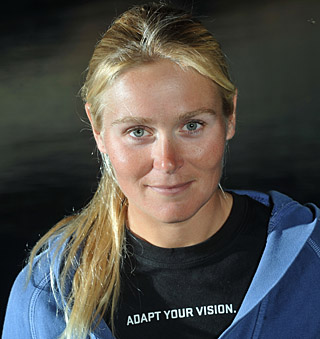
Uli Bromme is a late blooming professional triathlete based in Boulder whose steadily improving stats and results leave her chasing success in an era when the bar for the top women triathletes is rising fast. Consider the results achieved by the 29-year-old in a 5 year triathlon career starting at age 24 — the last two years as a professional. In 2009, she took second at the 2009 USA Triathlon Duathlon Elite Nationals. In 2010, Bromme took 4th professional at both the Kansas 70.3 and Boulder 70.3 and 4th at the USAT Elite Duathlon Nationals and 7th pro at Ironman Canada. Against the two toughest fields she faced during the year, Bromme was 11th pro at the Ironman 70.3 World Championship and 9th overall woman at Ironman Arizona.
In the Wellington era of quantum leaps in women’s performance, Bromme is one of many women who must feel a little like a racing greyhound chasing the mechanical rabbit that stays just out of reach. From a disappointing final age group performance in her debut at Ironman Hawaii in 2008 — in which she made rookie mistakes and finished in 11 hours plus — Bromme has come a long way. In 2010, she improved her Ironman PR to 9:46 at Canada, which placed her 7th, 33 minutes back of the winner but just 12 minutes out of the podium and two spots out of the money. Bromme topped that with a 9:31 at Ironman Arizona that was 55 minutes back of the winner Chrissie Wellington, 18 minutes off the podium, and two minutes and one place out of the money.
Bromme can see that the distance between her improving self and success is frustrating – but close enough so her dream remains bright. Operating on a modest budget, thrift has become a necessity. And so she has operated without a coach, making practical decisions about her training that have left her mostly injury-free and paid off with a rising performance curve.
Bromme was born in 1981 in Halle, a city of 250,000 near Leipzig in the former East Germany that was the home of the baroque composer Georg Friedrich Handel and two-time Olympic marathon champion Waldemar Cierpinski. Bromme’s family left after the Berlin Wall fell in 1991, settling first in Montreal, then moving to California and New Jersey.
Uli started swimming at age six and pursued it into her mid-teens. Inspired by her mother Christina's dedication to running, Bromme took it up herself at age 14. When one of her US high schools lacked a pool and a swim team, she joined the cross country and track teams and enjoyed competitive success. At Rider University in Lawrenceville, New Jersey, her PRs were a 5:11 mile, 10:50 for 3000 meters and an 18:22 5k. As it turns out, her greatest potential was at longer distances. After graduating with a degree in radio and television communications, she took up the marathon. In 2004, she moved to Boulder and two years later took up triathlon.
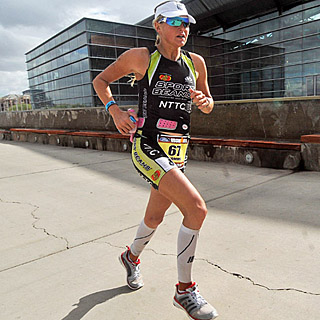
Slowtwitch: After college, how did your first marathon go?
Uli Bromme: I signed up for the New York Marathon in 2002. I had no idea what I could do because the longest race to that point was a 10k. My college coach was still giving me workouts and she estimated I would probably go 3:15. I felt really good the whole time and ran 2:56:21 and ended up 34th female overall. I was really excited and wanted to see if I could qualify for the U.S. Olympic Trials. The B standard at that time was 2:48 — only 8 minutes faster – and I thought I could do it.
ST: What happened?
Uli The next couple of years I ran all the major marathons — Boston, Chicago and New York again as well as Vancouver and Twin Cities – but I overtrained, got injured and didn’t get under three hours. Everything I was reading led me to believe you had to do 100 miles a week, and I think that’s what got me in trouble. Now I run half that much and my times are faster.
ST: What led you to pick up and move from New Jersey to Boulder?
Uli: I thought my running would get better with altitude training. But it seemed like it took a year before I could break 8 minutes a mile. It felt like I had dead legs every day. Finally, I came around
ST: How did you put food on the table?
Uli: I worked a couple of customer service and distribution jobs with flexible schedules part time so I could train. I tried working full time for a while which meant training early in the morning and at night when I was tired. I found that if I wanted to be the best athlete I can be, I needed to make time to train and still get proper recovery, rest and sleep. I think that is one of the reasons I have been pretty injury free. Judging from my past in running, I was always hurt when I was training heavily and didn’t get enough rest.
ST: What led you to triathlon?
Uli: I remember watching some of the girls racing the Boulder 5430 half Ironman in 2005 and thinking, ‘Wonder if I could do that?’ So I got a bike and started riding. I think my first ride was about 20 miles and I felt like a hero. Because I had been injured, I substituted the bike and the swim for the running. At this point I gave up on my dream to be a pro runner. I thought if I get really great at triathlon I can be a pro because I was a stronger runner in triathlon than I was just running.
ST: How did your first triathlons go?
Uli: I did the Boulder 5430 sprint in 2006 and I don’t think I placed in my age group. Then I did the Boulder 5430 half and finished in 5:03. When I broke five hours at my next half Ironman, I was really excited. In 2007 I got serious and did a 4:42 for the Boulder half and started pushing myself more and more.
ST: Where did this lead?
Uli: In 2008 I did Buffalo Springs 70.3 and finished in 4:56. I was 16th overall and 1st in 25-29 and qualified for Hawaii. I was still relatively new at the sport and had no idea what was coming in the Ironman. It was the toughest thing I’ve ever done and I did everything wrong.
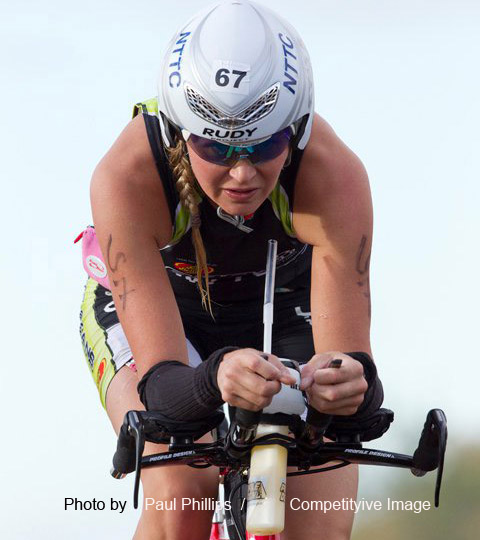
ST: What was your first mistake?
Uli: Nutrition. I told a friend who had done the race I had a hard time getting fluids down and he told me I should try Ensure on the bike. It worked in training, but during the race. with the humidity and the heat, I couldn’t keep it down, so I totally bonked. On top of that, I’d never seen wind like that in my life. I was so scared I rode on my hoods the entire time and got off and walked a couple of times. I don’t know how people are able to ride in the aero position and not be afraid. I was asked if I wanted to drop out and I was really close to doing that.
ST: Perhaps you were hoping your run would rescue your race?
Uli: I felt so nauseous the first half of the run, it was awful. It took me almost 4 hours. I think I walked half of it. I didn’t know much about salt. I think I took a few salt tablets. But my whole system was so messed up I was running on empty.
ST: Sounds like you were on the edge of surrender. What got you through??
Uli: I saw my parents on the run in town and I have a video of me crying, ‘I can’t do this! I can’t do this! I have to drop out!’ My mother said, ‘No, you can do it. Keep going.’ I just shuffled on and I am glad I finished. But it wasn’t pretty. By the end, I felt like my femur was breaking. I did 11:25 and was completely humbled.
ST: How long did it take to recover?
Uli: After the race my boyfriend took a video and asked ‘How are you feeling?’ I just lay on the bed. I wanted to get back out to watch the last couple of finishers, but I couldn’t move. Just wiggling my toe made me want to throw up. I craved all the salt I could get. All I could eat was one of those instant noodles and some tomato juice. I couldn’t really move for three days.
ST: Why was it so hard?
Uli: It was just my third year of triathlon and my body wasn't ready for the transition from a 112 mile bike to a 26 mile run. I did my long runs but I never really followed them with a long run. I did my long runs earlier in the week and then the bike on the weekends. I never did my long runs on tired legs.
ST: You still came back.
Uli: It’s funny. Eventually your body and your mind forget about the pain and you just want to do another one.
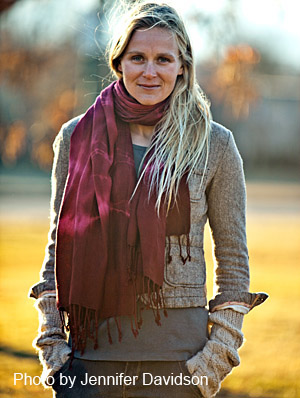
ST: After that experience, what led you to turn pro the very next season?
Uli: That was my last race of 2008 and it ended on such a bad note. But I got my pro license anyway because I was placing in the top 3 in my age group in every single race and wanted to see how far I could push myself. As an age grouper, I’d hit the qualifying marks for getting my pro license, so I said ‘Why not? I’ll give it a shot.’
ST: You had an encouraging start, winning a bit of prize money in your first pro race at the 2009 Desert Classic Duathlon in Arizona and followed that up with a second place at the USAT Duathlon Elite Nationals in Alabama. Then you failed to place in the money in first triathlons. What was your first pro breakthrough?
Uli: My breakthrough race was Ironman Arizona at the end of 2009, my first Ironman after my horrible experience in Kona. My goal was 10 and a half hours. I didn’t really know the course but I knew it was flat and easier than Kona. But I heard that it could be really windy there too.
ST: What did you do different in training?
Uli: Because every year I get a little stronger, I was able to take on more hours per week. I also did my key long workouts back-to-back. I did my long ride on Saturday and sometimes I would do a short run after that. Then I did my long runs on Sunday so my legs would be used to running fatigued.
ST: How did it go?
Uli: I did a 9:47, which was respectable for my second-ever Ironman and it was almost an hour and a half faster than my first. I was truly happy and I cried when I came across the finish line. My mom Christina was there again. She was overwhelmed and she cried too. I was 10th overall in a pretty stacked field and 40 minutes back of Sam McGlone, who won.
ST: You virtually duplicated your Ironman PR at Ironman Canada in 2010, but you felt you made significant gains. Why?
Uli: Canada was a tougher course and the weather made it rougher. Starting out, I lost my chain on an uphill and got off my bike and lost a couple spots. Once I got to the mountains the it started raining and then hailing. To make it worse, I didn’t bring a rain jacket. On the descent from Yellow Lake at Mile 80, the rain was coming down sideways so I felt like I was surfing on my bike. I was so cold I could not control my shivering and I was shaking my bike. I thought about dropping out. But again, that little voice in my head said keep going and it will get better. When I got off my bike, I was frozen solid and I was hungry because I think the cold burns so many more calories. I scarfed down half a Power Bar as I started to run. It was kind of scary, because I thought I could have choked.
ST: How did your body respond after that ride?
Uli: I ended up running 3:10, the third fastest women’s run of the day. The run course was not easy but I just thought about training on the hills back home in Boulder and how the hills in Canada felt a lot easier. Meredith Kessler was just a couple seconds faster than I — and she won the race. I did 9:46, which was a minute faster than Arizona on a much tougher course on a much tougher day. I was 7th. Once again, I was out of the money – only the top 5 got paid — four minutes back of 5th place.
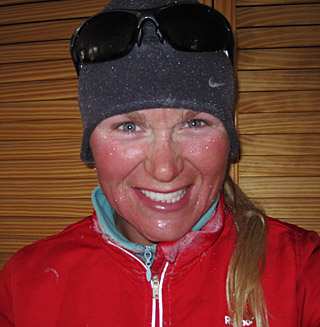
ST: You say you’ve stayed healthy by getting enough rest. So why did you do two long races in 8 days at the end of the season?
Uli: I qualified for Clearwater in Boulder 70. 3 where I did a 4:26. I have to thank Julie Dibens because she waited at the finish line because she wanted all the girls to get their slots for IM 70.3 Worlds.
ST: You were slower than you rode at Boulder 70.3 and came off the bike well back of the lead pack at Clearwater. How did you regroup?
Uli: There was absolutely nobody around me. I got passed by one age group male and the rest of the ride I worked by myself. There was a lot of headwind and it definitely slowed me down. I was 15th pro starting the run — and ran myself up to 11th . — one minute and one spot out of the money. But I was definitely happy because I achieved a goal I’d set for the season by breaking 1:25.
ST: Sounds like you were rolling the dice to race Arizona one week later.
Uli: It was tough weather again. I think it was hailing and terribly windy. On the bike, I got through a really, really bad spot where I felt like I did at Kona. I doubted myself and thought, ‘This is stupid. I shouldn’t have raced so close after Clearwater. Now I am paying the price.’ Luckily I had a Red Bull and I felt so much better and I was able to push coming back into town. I set a PR — 5:12.
ST: How much did you have left for the run?
Uli: It was really windy and raining and there were some insane headwinds. I started running the first couple miles with Heleen Bij de Vaate, who won this race in 2008. But then nature called and I hit the Porta Potty. I never caught back up and she finished about 2 minutes ahead of me in 8th. I finished in 9:31 – my Ironman PR. I ran 3:14 — not a PR, but still a lot faster than the year before.
ST: After Arizona, you took a rest then you tested yourself again.
Uli: I ran the Mississippi Blues Marathon in January on a very hilly course and PR’d with a 2:49:50. I was running with these other pro runners who seemed to be half my size and right at the gun they were way out front running 6 minute miles. I knew I couldn’t keep up and ran the whole time by myself. I kept looking at my watch and thinking, ‘If you want to break 2:50, you really have to push.’ I didn’t think I was going to do it because that course was pretty hilly and the finish was uphill. But when I saw the clock, I thought: ‘OK!’ The Olympic B standard right now is 2:46, so I’m doing another marathon in March in Little Rock, Arkansas.
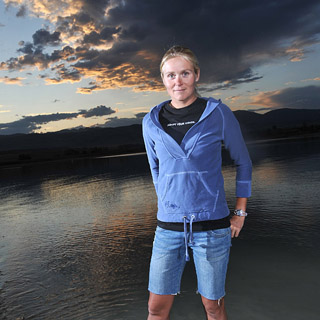
ST: Why are you self coached?
Uli: I’ve been pretty much self-coached the entire time since I started racing. One of the reasons I don’t have a coach is that I just can’t afford to pay for one at this point. I get a little bit of advice if I ask people. But basically I just try to use my own experience with intuition. In Boulder you hear a lot of stuff from coaches and other athletes and I think I absorbed some basic common sense guidelines. I try not to overtrain. I know I only have one body and I try to treat it with respect. I train hard, but I don’t kill myself every single workout. I know that in order to get better, you have to fatigue your body but then give your body rest.
ST: What is your sponsor situation?
Uli: I was on Team Sport Beans last year. It was a good program, but unfortunately they could not find a title sponsor this year. So I have contacted a couple of sponsors and I am finalizing things with them.
ST: You’ve been here for almost two decades and I can’t hear any German accent. What accounts for this?
Uli: At this point in my life, I definitely feel more at home in the US. I visit my Grandma, my aunt and my cousins in Germany every couple of years, but I feel I am more of a visitor now. A couple of times, when I speak to my Granma, I stop in mid-conversation because I am searching for the word I want. It’s kind of scary because I definitely want to keep the language. But it's hard when you don’t speak it to anyone where you live.
ST: Are any of your character traits German?
Uli: In my style of racing, I relate to my German heritage. People always say Germans are tough and strong willed and stubborn. I think that really helps with triathlon because I come from a family that doesn’t give up easily. My mom always tells me, ‘We are strong women. We don’t quit. We keep going.’ So when things get tough in the race, I just draw on that. I never want to drop out of a race for anything except emergency medical reasons.
ST: What memories do you have of life in Germany?
Uli: When I was a child and the Wall was still up, I remember that we didn't have oranges, pineapples and bananas all year round. I remember the lines at the grocery store were long just before Christmas because oranges were available. And they didn’t have as many different toys as we have now. I don’t know if that is necessarily a bad thing.
ST: Was it hard growing up there?
Uli: We were just happy kids and I didn’t experience any sense that things were hard. Just that we were not allowed to travel to Western countries. Our vacations were spent in Germany, and we went to Russia to see friends once and we went to the Czech Republic another time. But when you are five, six , seven years old you don’t really care. I remember when the Berlin Wall came down it was a big deal. I think I was eight at the time and what I noticed was that all of a sudden we had more variety in the stores. I got a Barbie doll. CHUCKLES.
ST: What do you think about your future in the sport?
Uli: This year will be my third racing pro. I am also turning the big 3-0. So I know my best years are still ahead for peaking as a woman in endurance sports. I think if everything keeps going well, if I don’t get hurt and I keep improving, I definitely think I can be as good as most anyone out there.
ST: Aren’t you discouraged that triathlon’s best women keep getting so much faster?
Uli: I think women’s triathlon has definitely stepped up. In the last two years, times have gotten so much faster. Heleen Bij de Vaate, who won Ironman Arizona in 2008 was only 8th last year in a similar time. Chrissie raised the bar and now everyone else is raising the bar as well. It’s definitely not super easy to be a pro now. But it is fun.
ST: What does this prove?
Uli: It definitely proves the human spirit is powerful. That all of us are capable of doing something greater than we may imagine. I proved this to myself. If you had told me two years ago I would be doing a 9 and a half hour ironman I would have said no way! I would never do that! But I did it and now the sky’s the limit.
Uli Bromme's blog can be found at www.ulibromme.com



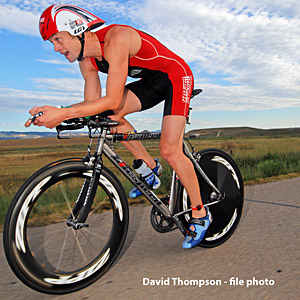
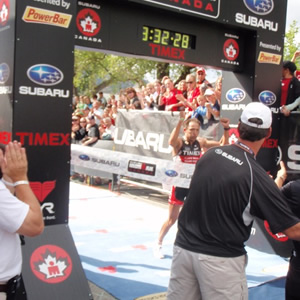

Start the discussion at forum.slowtwitch.com